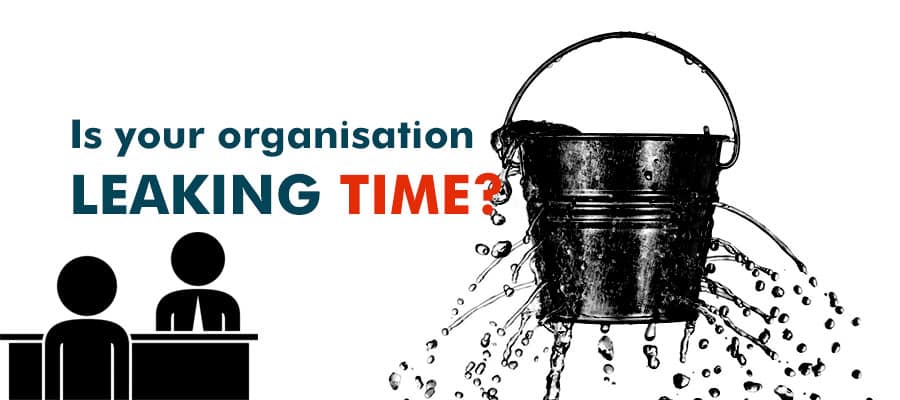Are you Leaking Time?

I am frustrated by inefficiencies that waste time. With everyone wanting to achieve more as quickly as possible, time has become a precious commodity that needs to be used with great care, and protected fiercely. A lot of workplace pressure and ‘stress talk’ may have their origins in overload of work schedule, but are manifested through inefficiency of time use.
Whilst there are some inefficiencies that come from poor planning or over ambitious scheduling, the true villain of efficiency comes from the habitual steps, cumbersome procedures and out-dated processes.
Organisations are leaking time through inefficient systems.
I was in a bank and noticed a queue of 5 people, all of whom were losing time to fulfil transactions that probably could be done through other means (online, phone, etc.). The bank are paying staff, who are clearly not trying to get through an hourly quota of customers, to do tasks that computers can do. Colossal waste of time. Colossal waste of resources. In times when we can paypass, electronically transfer, and verify our identity online through voice recognition software, it is illogical that we are still stuck using systems, created in the dark ages, that bleed so much precious time.
In the same bank, that has state of the art online security, they required that I fill in a written form that gets faxed to head office, and will need someone to physically collect it and place it on a pile on a desk for someone else to process in the next 3-5 business days. Are you kidding me?? I thought they were joking, but this is how identification was validated was processed.
Look at how you are operating, do you use procedures that are cumbersome, out-dated and ineffective? Are you touching too many bits of paper, too many emails, or getting involved in too many activities. We should value time the same way that a drowning person would value oxygen.
Leaders can leak time through habits of thinking.
An important skill for many new and emerging leaders is reclaiming their time and focusing on the high dollar productive activities. Too often, new leaders prioritise perfectionism (the need to do a job right) over implementation (the need to get the job done) which can slow down productivity and impair their ability to achieve their strategic objectives. They also wrestle with the battle between personalisation (doing the job themselves) and delegation (letting go of control and handing it over to someone else to do). Select how you allocate your time with the precision that a coach use to would select their team to play in a grand final.
It’s wonderful to make plans, set goals, create systems, and to lead with high standards of excellence, want continual improvement, and expect nothing but the best. To achieve those outcomes and meet high expectations, however, requires a deep resource of energy.
The modern day approach of getting loaded up on enough caffeine and energy drinks to keep a small country awake for 4 days, and then surrounding yourself with positive self talk and motivational slogans of ‘dream it, believe it, achieve it’, and ‘if it is going to be, it’s up to me’ is an attempt to get fuelled up so you can tear through the day and achieve as much as possible. This creates a burst of adrenaline, which may distort where you place your priorities and how accurately you allocate the correct time-task ratios. Over excitement leads to ‘chasing the shiny object syndrome’ and impulsive decision making, and it then followed with a drop in blood sugar levels accompanied with mood swings, energy crashes, and a general state of poor functioning. Be aware that your energy is your currency so you need to invest it wisely, and nurture it.
Time can get lost in saving other people and healing their pain.
There will always be dramas and people who need help with something. When you over-give your time to solve other people’s problems and fix their issues, you are undervaluing your time and reducing the amount of focus you can put into your own priorities. You may be leaking time through the need to be overly helpful and to be validated by others.
Leaders can leak time through emotional decision making.
In the 1980s and 1990s multitasking was the top time-management tip. You were taught to chunk your work into timed blocks and order your day like a military operation. In 1984, Steven Covey inspired us to do ‘first things first’ and decipher between the urgent and important tasks, followed by Brian Tracey (in 2001) who explained that we should ‘eat that frog’ and do the most difficult things first as the best way to stop procrastination and get more done. in 2007, Tim Ferriss published the game changing philosophy of the ‘4 hour work week’ challenging us to outsource, streamline and muse our way to success.
Whilst all these philosophies have sold thousands of books, courses and speeches, and extoll practical advice that has saved people so much time, cut down stress, and increased productivity, you are probably still sitting there, even as you read this article, wondering how you are going to get everything done without burning yourself out?
The underlying problem here is not the shuffling of time, but rather the allocation of attention. Decisions determine where your attention goes, for how long, and what tasks you will do. A good decision making philosophy is like having an experienced captain at the helm of a ship who is able to navigate the ocean and arrive at the destination with minimal exertion and disruption.
Creel Price launched his first business at age 11 selling strawberries in rural New South Wales. In fact, he launched a total of eight businesses by the time he left school and a further two at university, and, at age 25, he co-founded Blueprint Management Group with just $5,000 in capital, without any follow on investment, until they exited a decade later for $109 million. Creel and his business partner built one of Australia’s fastest growing companies (BRW Fast 100) in the marketing, e-commerce, call centre and data analytics sectors. Creel credits a major contributor of his success to the art of ‘Decisionship’. He feels that ‘the ability to make better, faster decisions without the angst, is key to success’.
When you are being bombarded with volumes of work, your decisions are influenced by time urgency, personal standards, management expectation, and team time frames. Your decisions are now tainted by these pressures and stresses which drive you to make more emotionally based decisions, instead of logical ones.
When your decisions are driven by emotion (such as stress, anxiety, or adrenaline), then you are more likely to create short term solutions, handle too much yourself (instead of delegating) and react to whatever is the most urgent emergency to fix.
To be time effective, especially in a leadership role, you need to be ruthless about where you give your attention.
Final thoughts
Time efficiency is as much about the underlying habits of behaviour and your relationship with pressure as it is about planning and structure. For all the time and expense invested in planning, it would be worth looking at where you are unwittingly leaking time and plug it up.
Have you read?
Indispensability of Change Management in Digital Transformations
Albert Einstein’s 40 Greatest Quotes
What are the technological forces transforming the business world?
Written by Michael Licenblat, Resilience expert, keynote speaker, and author.
Bring the best of the CEOWORLD magazine's global journalism to audiences in the United States and around the world. - Add CEOWORLD magazine to your Google News feed.
Follow CEOWORLD magazine headlines on: Google News, LinkedIn, Twitter, and Facebook.
Copyright 2025 The CEOWORLD magazine. All rights reserved. This material (and any extract from it) must not be copied, redistributed or placed on any website, without CEOWORLD magazine' prior written consent. For media queries, please contact: info@ceoworld.biz











